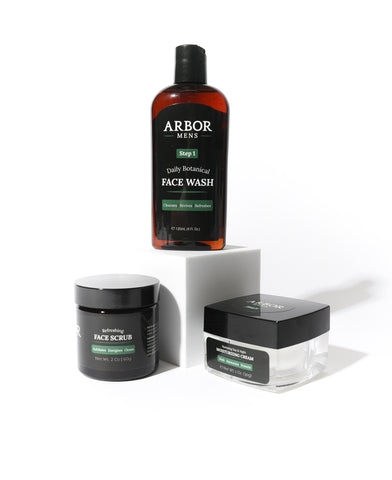How Do You Have Oily Skin?
Oily skin happens when the sebaceous glands in the skin make too much sebum. Sebum is the waxy, oily substance that protects and hydrates the skin. Sebum is vital for keeping the skin healthy. Oil or sebum is not a bad thing for your body to create! However, too much sebum can lead to oily skin, clogged pores, and acne.
Lack of Moisturization: Believe it or not, if you use drying or alcohol based products on your skin, you are actually drying out your skin that creates your glands to overproduce oil and create that oily skin appeal. It is important to always make sure your products like cleansers, lotions, and even shaving cream are not doused with perfumes or alcohol based ingredients. Its good to look for skin care bundles that are natural and contain hyaluronic acid. Hyaluronic acid holds the moisture in your skin cells leaving you looking less oily and much healthier and hydrated.
Oily is not hydrated! Remember that.

Moisturizers which also have hyaluronic acid also are key for preventing oily skin and are recommended to put on in the morning and in the evening after you wash your face.
Signs of Oily Skin
Shiny look, slick feeling are the two biggest traits of oily skin. It’s not pretty because a greasy shine isn’t a healthy hydrated shine. Another sign is the expansion of your pores. Sometimes pores that look larger are more genetic and aging based and cannot always be helped. However, oily skin creates dilated pores as it continues to try to create an overproduction of sebum. Moisturizing will help cut the production of sebum and let your pores maintain smaller openings.
Some pores may not grow in dilation. However, increased oil production can also create acne...
Oily Skin and Acne
Overproduction of oil can mix with trapped dirt and bacteria and create clogged pores. This creates infections on the skin or pimples.
Oil build up clogs pores causing acne such as: White heads, cystic acne, black heads, and other forms of clogged pores. They're visible, unattractive, but most of all uncomfortable and create wear and tear on the skin and can leave major scarring.
Skin Routine that Solves these Problems:
First, you should always wash your face with a good cleanser that removes the dirt and unnecessary oil and does not strip away too much to where your skin is dehydrated. Do this twice a day every day; preferably in the morning and in the evening.
It’s important to use the right cleanser with key ingredients- Here’s a list of ingredients and the Why:
Rosehip Seed Oil is rich in essential fatty acids and antioxidants essential to rejuvenating your skin. It’s collagen-supporting Vitamin C & A may explain why it’s used to firm skin and fade scars. Add Rosehip’s redness and irritation fighting properties and its a no-brainer.
Geranium Oil defends against a whopping 24 different types of bacteria and fungi, a primary contributor to blemishes and facial irritation. Not to mention it’s a powerful anti-inflammatory that helps soothe and balance skin tone.
Red Seaweed Extract is a natural source of amino acids, peptides, and antioxidants like zeaxanthin and lutein - which help protect the skin from blue light. It also creates a microscopic protective film to defend against environmental toxins.
Glycerin is a humectant. Rather than directly adding moisture, it acts like a magnet and pulls in moisture from the air.
Second, you should use a scrub that can do the job of a deeper clean and really strip away the dead skin and oil stuck in pores that could create deeper acne. It is recommended to use a scrub two to three times a week. Over exfoliation can also increase oil intake and create the same oily skin issues you were trying to get rid of or avoid.
It’s important to use the right scrub with key ingredients- Here’s a list of ingredients and the why:
Forget those jagged salt crystals and exfoliating plastic beads that most scrubs use. Amber powder is a microscopic organic compound that gently pulls dead skin from every nook and cranny. This ultra-fine exfoliation unclogs your pores and leaves your skin soft and smooth to the touch.
Oil and water don’t mix. Sodium Cocoyl Apple Amino Acids a surfactant - a compound that reduces the surface tension of oily skin so each ingredient can penetrate its surface. Few surfactants can do this without stripping away moisture - SCAAA is an organic compound that gives your skin a balanced, non-greasy, shine-free finish that looks natural and healthy.
But more importantly, it clears the way for our moisture-locking ingredients...
Honey Extract is a one-two punch. First, its a humectant - it attracts moisture 3x better than synthetic Glycerin. Second, honey has anti-bacterial, anti-fungal, and anti-viral properties along with vitamins, minerals, and amino acids to nourish and protect your skin.
We’ve added Aquaxyl - a novel compound that’s been studied to boost the moisture-locking power of humectants by 56%, and the effect lasts for more than 8 hours... a moisturizer that evaporates in minutes is doing you no favors.
Honey extract frees the proteins and lipids that rebuild and repair your skin, and Aquaxyl gives them enough time to do it properly.
Third, Moisturizer! Lather it on. You don't need much but twice a day every day will keep your skin healthy and looking the way it is; hydrated.
It’s important to use the right moisturizer with key ingredients- Here’s a list of ingredients and the Why:
Without oils (like fatty acids and Vitamin E), the molecular processes that repair and maintain healthy vibrant skin come to a screeching halt...
Jojoba Seed Oil actually balances excess oil and unclogs pores - making it a favorite of those with acne and dry skin.
Better yet, Jojoba has a well-studied ability to stimulate collagen synthesis and contains critical skincare nutrients like Vitamin E and Iodine - which can boost skin elasticity and fight off environmental toxins.
Apricot Kernel Oil has similar benefits but one special one...it fights acne and blemishes with its linoleic acid content.
Linoleic acid fights a process known as ‘hyperkeratinization’ - which can make skin cells stick together and clog pores. Without getting too complicated, there’s a strong correlation between acne and low levels of linoleic acid. And for those with extra-rosy cheeks, Apricot Kernel Oil is a soothing anti-inflammatory that promotes a healthy, even skin tone.
You lose squalene as you age, a lipid that makes up over 10% of your skin’s natural hydrating oils. That’s one reason your skin isn’t as silky smooth as it once was...
The good news is Squalane is a plant-derived form that makes up for your losses - boosting hydration, softening the skin’s appearance, and detoxifying at the same time.
Hyaluronic Acid is another naturally-occurring molecule we produce less of with age. It binds water to collagen and locks in moisture, holding 1,000 times its weight in water.




